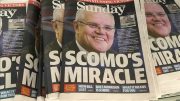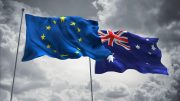Britain Beware! Special relationships are rarely worth much when national interest overtakes rhetoric, writes Geoff Kitney.
When President Donald Trump made his recent trip to London he was full of flattery and promising favouritism. Brexit would be brilliant once Britain was free of the clutches of the European Union and the United States stood ready to make it so by the “best ever” free trade agreement with the UK.
But here is a threshold question: Why would an American President whose entire political creed is based on the great rallying cry for US patriots “Put America First” set this aside for giving Britain a trade deal which did not put America first?
And, even more importantly, why would a British Prime Minister put the economic fate of their country in the hands of someone who so obviously says one thing but is absolutely committed to another?
And what would happen if, in the midst of negotiations for a trade deal there was a change of government in the UK? What would be the chances that Donald Trump doing what he seems best at – walking away from a deal because he doesn’t like whom he is dealing with?
Trump clearly loves Brexit because it sticks it up the hated European Union.
But it is highly doubtful that he loves it enough to create political risks for himself back in America by doing a trade deal for which there is no precedent and for which he would suffer personal domestic political damage. And this is the reality: there is no precedent for one country setting aside its own national interest to do a trade deal that advantages another country.
Boris Johnson one year ago: “I am increasingly admiring of Donald Trump … I have become more and more convinced that there is method in his madness.” and other insightful quotes. https://t.co/Q3qHzyS4Ag
— Chief-Exec.com (@Chief_Exec_com) 17 June 2019
Donald Trump wants to smash the rules-based international trading system to make sure the United States sets the rules in a way that puts America first.
He has made it abundantly clear that he hates multilateral trade agreements because they force the United States to accept compromises which restrict the US’s ability to use its economic muscle to gain unfair advantages. In this, he is cheered on by much of the US business establishment, from its huge pharmaceutical conglomerates to its vast agribusinesses, even down to its small farmers.
These sectors in particular would love a free trade agreement (FTA) with the United Kingdom which would open its economy – and the great institution of the National Health Service (NHS) – to the full blast of their competition.
But some would argue this is just scare-mongering, mere speculation based on anti-Trump or anti-American bias, that Trump really does want to make concessions to help Britain because he has such a powerful interest in delivering a smashing blow to that carbuncle of a creation – the European Union.
Except that there is some history here worth recounting.
In the lead-up to the 2003 invasion of Iraq by George W Bush’s “coalition of the willing” the then Australian Prime Minister, John Howard, became one of the first world leaders to back Bush, even before then UK Prime Minister Tony Blair.
Like the US and UK Governments, Howard’s government insisted that it’s defence and intelligence experts were satisfied with US intelligence which showed that Saddam Hussein had developed weapons of mass destruction and was a serious threat to the world.
Howard’s backing was unpopular with voters and there were big protest rallies. When Australian forces were despatched to the Middle East, the then Opposition leader Simon Crean declared his opposition to the deployment, for which he was pilloried by the government and many in the mainstream media.
Howard won high praise from President Bush who declared him a “man of steel” and his “deputy sheriff”.
In the wake of the Iraq war, Bush promised to do a bilateral trade agreement with Australia which was interpreted as a “reward” for Howard’s early support for Bush’s Iraq plans. Bush promised to deliver the deal in record time.
‘Deals struck in haste for primarily political reasons carry the risk of substantial economic damage.’ Australian Institute of International Affairs
There was heavy political pressure on bureaucrats and trade negotiators to wrap up the deal as quickly as possible. After just six negotiating sessions, a deal was agreed.
But in the process, some major differences were glossed over. The US refused open access for Australian sugar producers to the US market. Access for other agricultural products fell well short of “free”.
Australia was also forced to concede important ground on intellectual property rights, finally signing off on an extension from 50 to 70 years for copyright for US produced material.
On one of the most politically sensitive issues – a push by US drug companies to gain open access to Australia’s drug markets – the deal almost collapsed at the last minute.
Australia has a national health system with some elements similar to that of the UK’s NHS. Basic health costs are covered by the government-run Medicare, with private providers offering extra cover. Part of the system is the Pharmaceutical Benefits Scheme which is the primary provider for all Australians of drugs at affordable prices. The PBS uses its buying power to command lower drug prices from the major global drug companies.
US drug manufacturers wanted the FTA negotiations to target the PBS for what they claim was anti-competitive and price gouging powers, which they argued meant they had to sell their drugs at lower prices and, therefore, undermined the ability of the companies to invest in developing new drugs.
The push to undermine the PBS was blocked by the upper house of the Australian Parliament – the Senate – which refused to ratify the Australia-US FTA legislation unless protections for the PBS were included.
After more than a decade of its operation, the FTA has produced mixed results. It certainly has not been a roaring economic success and it is debatable whether it ultimately had any political value.
A study published by the Australian Institute of International Affairs found that the agreement had actually been an economic failure, marginally reducing rather than adding to economic growth in both countries because it “diverted trade in both the US and Australia away from lowest cost sources”.
“Deals struck in haste for primarily political reasons carry the risk of substantial economic damage,” the author of the report noted.
Evidence of the dubious benefits of the Australia-US FTA is only part of a wider story about the value of FTA’s. Australia’s highly regarded Productivity Commission has consistently questioned the value of FTA’s compared to multilateral trade agreements and unilateral trade liberalisation.
Why would an American President whose entire political creed is based on the great rallying cry for US patriots “Put America First” set this aside for giving Britain a trade deal which did not put America first?
Another “real world” concern for any country considering entering into FTA negotiations is the inclusion in all contemporary FTA’s of so-called Investor-to-State Dispute Settlement provisions (ISDS), which I have written about previously on Chief-Exec.com.
These are certain to be contained in any UK-US FTA and would allow US corporations to attempt to use special courts to overturn or seek compensation for any sovereign law of the UK which they considered damaging to their businesses.
And, as Trump’s recent behaviour – his sudden decision to slap a five per cent tariff on Mexico despite a recently celebrated FTA – has confirmed, no agreement is safe in his hands. Who would ever really trust him?
And a final important point to add on this issue.
The UK currently runs a trade surplus with the US – worth around £40 billion.
Donald Trump hates trade deficits. In his simplistic economic word, trade deficits mean that the country which runs the surplus is taking the US for a ride.
Trump would want any trade agreement to the UK to be a “victory” for the US – in other words a trade agreement which turns Britain’s advantage in trade to a disadvantage for it and an advantage for the US.
So, behind Donald Trump’s flattery and bluster, there is a very complex story which raises troubling questions which the breezy rhetoric of the Brexit lobby foolishly glosses over.

Headline image credit: Evan El-Amin / Shutterstock.com




